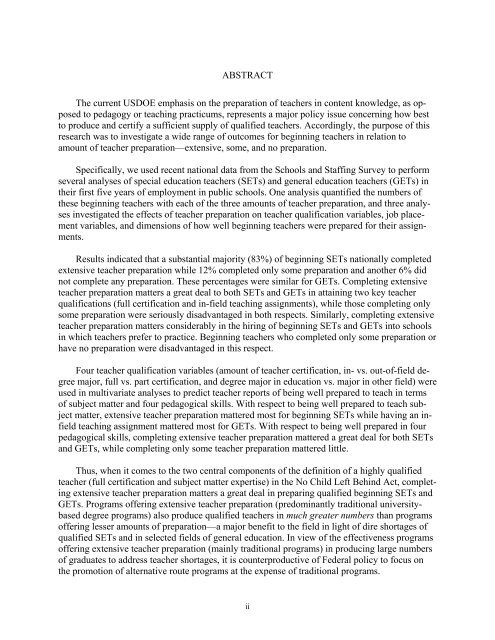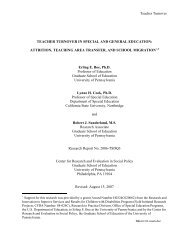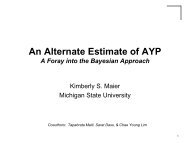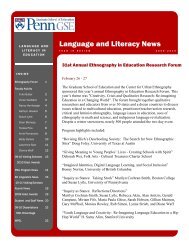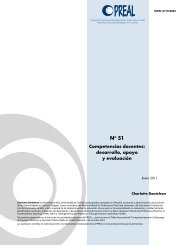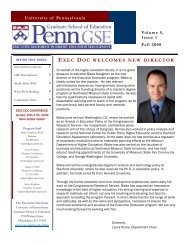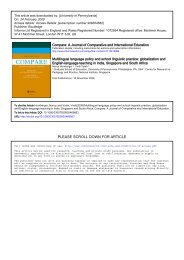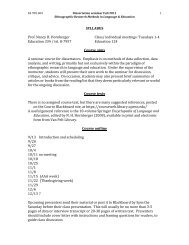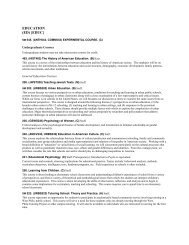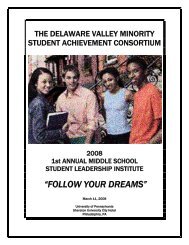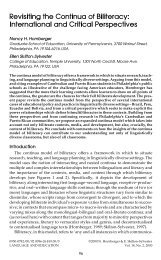does teacher preparation matter for beginning teachers in
does teacher preparation matter for beginning teachers in
does teacher preparation matter for beginning teachers in
Create successful ePaper yourself
Turn your PDF publications into a flip-book with our unique Google optimized e-Paper software.
ABSTRACT<br />
The current USDOE emphasis on the <strong>preparation</strong> of <strong>teacher</strong>s <strong>in</strong> content knowledge, as opposed<br />
to pedagogy or teach<strong>in</strong>g practicums, represents a major policy issue concern<strong>in</strong>g how best<br />
to produce and certify a sufficient supply of qualified <strong>teacher</strong>s. Accord<strong>in</strong>gly, the purpose of this<br />
research was to <strong>in</strong>vestigate a wide range of outcomes <strong>for</strong> <strong>beg<strong>in</strong>n<strong>in</strong>g</strong> <strong>teacher</strong>s <strong>in</strong> relation to<br />
amount of <strong>teacher</strong> <strong>preparation</strong>—extensive, some, and no <strong>preparation</strong>.<br />
Specifically, we used recent national data from the Schools and Staff<strong>in</strong>g Survey to per<strong>for</strong>m<br />
several analyses of special education <strong>teacher</strong>s (SETs) and general education <strong>teacher</strong>s (GETs) <strong>in</strong><br />
their first five years of employment <strong>in</strong> public schools. One analysis quantified the numbers of<br />
these <strong>beg<strong>in</strong>n<strong>in</strong>g</strong> <strong>teacher</strong>s with each of the three amounts of <strong>teacher</strong> <strong>preparation</strong>, and three analyses<br />
<strong>in</strong>vestigated the effects of <strong>teacher</strong> <strong>preparation</strong> on <strong>teacher</strong> qualification variables, job placement<br />
variables, and dimensions of how well <strong>beg<strong>in</strong>n<strong>in</strong>g</strong> <strong>teacher</strong>s were prepared <strong>for</strong> their assignments.<br />
Results <strong>in</strong>dicated that a substantial majority (83%) of <strong>beg<strong>in</strong>n<strong>in</strong>g</strong> SETs nationally completed<br />
extensive <strong>teacher</strong> <strong>preparation</strong> while 12% completed only some <strong>preparation</strong> and another 6% did<br />
not complete any <strong>preparation</strong>. These percentages were similar <strong>for</strong> GETs. Complet<strong>in</strong>g extensive<br />
<strong>teacher</strong> <strong>preparation</strong> <strong>matter</strong>s a great deal to both SETs and GETs <strong>in</strong> atta<strong>in</strong><strong>in</strong>g two key <strong>teacher</strong><br />
qualifications (full certification and <strong>in</strong>-field teach<strong>in</strong>g assignments), while those complet<strong>in</strong>g only<br />
some <strong>preparation</strong> were seriously disadvantaged <strong>in</strong> both respects. Similarly, complet<strong>in</strong>g extensive<br />
<strong>teacher</strong> <strong>preparation</strong> <strong>matter</strong>s considerably <strong>in</strong> the hir<strong>in</strong>g of <strong>beg<strong>in</strong>n<strong>in</strong>g</strong> SETs and GETs <strong>in</strong>to schools<br />
<strong>in</strong> which <strong>teacher</strong>s prefer to practice. Beg<strong>in</strong>n<strong>in</strong>g <strong>teacher</strong>s who completed only some <strong>preparation</strong> or<br />
have no <strong>preparation</strong> were disadvantaged <strong>in</strong> this respect.<br />
Four <strong>teacher</strong> qualification variables (amount of <strong>teacher</strong> certification, <strong>in</strong>- vs. out-of-field degree<br />
major, full vs. part certification, and degree major <strong>in</strong> education vs. major <strong>in</strong> other field) were<br />
used <strong>in</strong> multivariate analyses to predict <strong>teacher</strong> reports of be<strong>in</strong>g well prepared to teach <strong>in</strong> terms<br />
of subject <strong>matter</strong> and four pedagogical skills. With respect to be<strong>in</strong>g well prepared to teach subject<br />
<strong>matter</strong>, extensive <strong>teacher</strong> <strong>preparation</strong> <strong>matter</strong>ed most <strong>for</strong> <strong>beg<strong>in</strong>n<strong>in</strong>g</strong> SETs while hav<strong>in</strong>g an <strong>in</strong>field<br />
teach<strong>in</strong>g assignment <strong>matter</strong>ed most <strong>for</strong> GETs. With respect to be<strong>in</strong>g well prepared <strong>in</strong> four<br />
pedagogical skills, complet<strong>in</strong>g extensive <strong>teacher</strong> <strong>preparation</strong> <strong>matter</strong>ed a great deal <strong>for</strong> both SETs<br />
and GETs, while complet<strong>in</strong>g only some <strong>teacher</strong> <strong>preparation</strong> <strong>matter</strong>ed little.<br />
Thus, when it comes to the two central components of the def<strong>in</strong>ition of a highly qualified<br />
<strong>teacher</strong> (full certification and subject <strong>matter</strong> expertise) <strong>in</strong> the No Child Left Beh<strong>in</strong>d Act, complet<strong>in</strong>g<br />
extensive <strong>teacher</strong> <strong>preparation</strong> <strong>matter</strong>s a great deal <strong>in</strong> prepar<strong>in</strong>g qualified <strong>beg<strong>in</strong>n<strong>in</strong>g</strong> SETs and<br />
GETs. Programs offer<strong>in</strong>g extensive <strong>teacher</strong> <strong>preparation</strong> (predom<strong>in</strong>antly traditional universitybased<br />
degree programs) also produce qualified <strong>teacher</strong>s <strong>in</strong> much greater numbers than programs<br />
offer<strong>in</strong>g lesser amounts of <strong>preparation</strong>—a major benefit to the field <strong>in</strong> light of dire shortages of<br />
qualified SETs and <strong>in</strong> selected fields of general education. In view of the effectiveness programs<br />
offer<strong>in</strong>g extensive <strong>teacher</strong> <strong>preparation</strong> (ma<strong>in</strong>ly traditional programs) <strong>in</strong> produc<strong>in</strong>g large numbers<br />
of graduates to address <strong>teacher</strong> shortages, it is counterproductive of Federal policy to focus on<br />
the promotion of alternative route programs at the expense of traditional programs.<br />
ii


